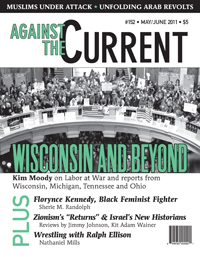Against the Current, No. 152, May/June 2011
-
Budget Woes, Class Wars
— The Editors -
Libya and the Arab Uprisings
— The Editors -
The Unfolding Arab Uprisings
— Suzi Weissman interviews Mark LeVine -
The Attack on American Muslims
— Malik Miah -
An Account from Madison
— Tessa Echeverria and Connor Donegan -
Gutting Cities and Public Education
— Dianne Feeley -
Tennessee: Another Battle Front
— Jase Short -
Ohio Workers, Services Under Fire
— Michael Connery -
Wisconsin and Beyond
— Kim Moody - May Day at 125
-
The Lasting Legacy of Florynce Kennedy, Black Feminist Fighter
— Sherie M. Randolph - Reviews
-
Wrestling with Ralph Ellison
— Nathaniel Mills -
Pappe and Israel's New Historians
— Kit Adam Wainer -
Zionism's Many "Returns"
— Jimmy Johnson -
Why the Revolt in Egypt?
— Dan La Botz -
Workers' Revolts of the 1970s
— Steve Downs -
Assignment 1: LGBT Equality
— Enku MC Ide - In Memoriam
-
Wilebaldo Solano, 1916-2010
— J. Martorell -
Wilebaldo Solano As I Knew Him
— Suzi Weissman -
Margaret Burroughs
— Brian Dolinar -
Julian Mer-Khamis
— The Editors - Dialogue
-
Rebuilding the Antiwar Movement
— Steve Bloom and Dayne Goodwin
Suzi Weissman
I FIRST MET Wilebaldo Solano in Paris in 1997 after corresponding with him since the late 1980s. I had translated an article Wilebaldo wrote about Victor Serge and the POUM,(1) and finally meeting him was an inexplicably emotional occasion, a moment of warmth, solidarity and enthusiasm for us (Wilebaldo, his wife Maria Teresa and myself).(2)
To hear Wilebaldo describe the meeting he and his young comrades from the POUM had with Victor Serge in 1939 confirmed what I sensed when I translated his account: it was so much more than that word reuníon (meeting) could describe.
By the time they met in February 1939 at Victor Serge’s apartment in Pre St. Gervais in Paris, emotions were running high. Franco’s offensive against Catalonia had just taken place and the main leaders of the POUM, who were being held in a special jail in the State Prison in Barcelona, had been evacuated to a small prison in Cadaques. Miraculously they managed to escape and cross the Pyrenees into France, where a group of militants from the PSOP (led by Daniel Guerín and organized by the POUM in Paris along with Marceau Pivert and Victor Serge) awaited them.
It was this group that met Victor Serge in Paris, in what was more a celebration than a meeting. Given the circumstances, the meeting was dramatic for Wilebaldo Solano, but filled with solidarity and friendship. Solano once wrote that reading Serge’s Men in Prison made an extraordinary impression on him and remained strongly recorded in his memory; he said that every time he was detained during his life as a militant he thought about what Serge had felt, and “felt interpreted by him.”
Solano was detained and condemned in Montauban to 20 years of forced labor in 1941 by a French military court at the service of the Gestapo. He was shut in the jail of Montauban and the garrison of Eysses for three and half years, until liberated by Resistance fighters in 1944.
Victor Serge was the strong bond of our friendship. Solano worked tirelessly in Paris and Barcelona until his death, speaking at meetings, publishing books and articles, and preserving (and often correcting) the record of the Spanish Civil War and Catalan historical memory. He was instrumental in helping Llibert Ferri make his extraordinary documentary about Andreu Nin (“Operation Nikolai,” by Ferri and Dolors Genovés) only possible once the Soviet archives were opened in 1992, in that brief window before they were again clamped shut.
I sat with Wilebaldo and Maria Teresa watching the film in his apartment on another occasion — trying desperately to understand Catalan as best I could. It was in this documentary that Soviet agents were confirmed as the authors of the defeat of the revolutionary movement on the Republican side during the civil war, even if the agents who killed Nin were not named.(3)
Solano was also an advisor to Ken Loach in making his film “Land and Freedom.” In a review of the film published in Revolutionary History, Solano wrote that the character of the English Communist David was inspired by a friend of his who was still alive when the film came out. For those who haven’t seen the film, “David” was one of the international militants who went to Barcelona and joined the POUM militias because, “during the first months when Stalin was practicing the policy of non-intervention, the Communist International forbade the sending of foreign militants to Spain. He, like other British, French and Italian Communist militants, chose to fight with the POUM, and some died on the Aragon front.”(4)
We are fortunate that Wilebaldo Solano published his article in Against the Current on the 70th anniversary of the founding of the POUM in ATC 143 — providing an American audience a precious primary resource from the Spanish Revolution. With Solano’s death an era passes, even as the struggle he maintained throughout his life is taken up by others across the globe today.
Notes
- Wilebaldo Solano, “Our POUM Comrade,” The Ideas of Victor Serge: A Life as a Work of Art, edited by Susan Weissman, Critique Books and Merlin Press, 1997.
back to text - Not to mention my friend Greg Jacks and my son and daughter Eli and Natalia Naduris Weissman, who accompanied me to the Solano apartment in Fontaney Sous Bois.
back to text - Stephen Schwartz, Letras Libres, January 2011, http://www.letraslibres.com/index.php?art=15197.
back to text - Revolutionary History, Vol. 6, No. 2-3, Summer 1996, 275-6.
back to text
ATC 152, May-June 2011

